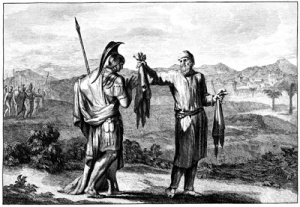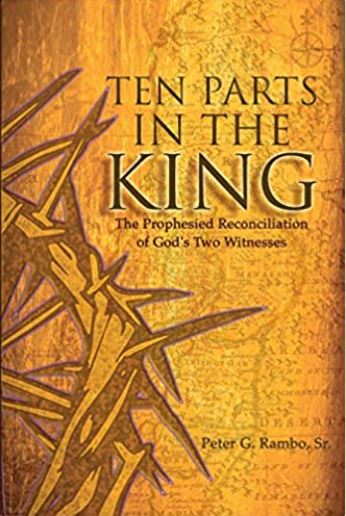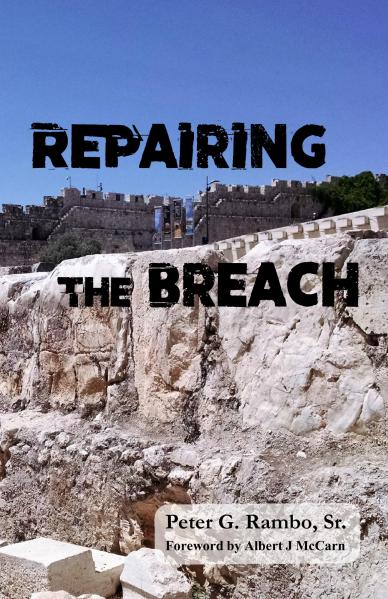Christianity, Judaism and many Messianics suffer from a common error that effects pretty significantly how they understand large parts of Scripture, and particularly current events, both geopolitical and eschatological.
 While this error may seem very simple on the surface, it creates a plethora of challenges in its wake. So, what is it? It is the part to whole fallacy that commonly equates Israel and Judah.
While this error may seem very simple on the surface, it creates a plethora of challenges in its wake. So, what is it? It is the part to whole fallacy that commonly equates Israel and Judah.
What I intend to demonstrate through this and several ensuing posts is that while scripture occasionally uses the terms ‘Judah’ and ‘Israel’ in parallel or even as synonyms, more often than not, the context, particularly in the prophets, indicates the message is to two very different groups of people.
Simply stated, Judah is not Israel, rather, they are part of Israel and for a period of time had/have a very different destiny in order to fulfill God’s plan and purpose. Most of us have been inculcated with a paradigm that uses the words ‘Judah’ and ‘Israel,’ or some derivative like ‘Jew’ or ‘Jewish’ interchangeably, when scripture does not seem to do this.
I know for many, this opens a difficult and sensitive topic, but I ask you to take a deep breath and let’s explore Scripture to understand the history and prophetic importance of this difference. In doing so I hope that we will not reduce the significance of anyone’s identity, nor will we elevate unfairly anyone’s identity. Rather, our goal is to understand the plan and heart of God.
As if this isn’t already a tall enough order, I further hope to take the time to present an analysis of individual prophets and how they approached these differing terms relative to their time and audience.
Terms that we will tackle will include, but not be limited to:
- Israel and Judah
- House of Israel and House of Judah
- Ephraim
- Joseph
- Jacob
- etc..
Let’s get started.
One has only to turn on the evening news to recognize that practically the entire world regards ‘Israel’ and ‘Jews’ as synonymous terms. “Today, in the Jewish state of Israel….” Whether we stop to think about it or not, the terms ‘Jew’ and ‘Israel’ were just equated, and while the nation of Israel indeed is populated primarily by Jews, their own documentation declares that it is the ancient land of Israel.
Another quick example is a blog I read the other day referring to the Torah being given to the Jews at Mt. Sinai. The statement was made in such a way as to assume that all who stood at the mountain were Jews, yet any simple reading of Scripture reveals that 13 tribes plus a mixed multitude of non-Hebrews stood at Sinai to receive the Law. The Torah was given to Israel, only one tribe of which was Judah. Part to whole fallacy.
These may seem minor, however, when one digs into prophecy and begins reading, the prophets do not, for the most part, use the terms interchangeably. Rather, they portent two very different destinies for two very different groups of people who are prophesied to come back together in the latter days. Over and over Israel and Judah are placed in juxtaposition in Scripture.
Here are a few examples, and I invite the reader to add to the list in the comment section.
6 Then the Lord said to me in the days of Josiah the king, “Have you seen what faithless Israel did? She went up on every high hill and under every green tree, and she was a harlot there. 7 I [a]thought, ‘After she has done all these things she will return to Me’; but she did not return, and her treacherous sister Judah saw it. 8 And I saw that for all the adulteries of faithless Israel, I had sent her away and given her a writ of divorce, yet her treacherous sister Judah did not fear; but she went and was a harlot also. 9 Because of the lightness of her harlotry, she polluted the land and committed adultery with stones and trees. 10 Yet in spite of all this her treacherous sister Judah did not return to Me with all her heart, but rather in deception,” declares the Lord.
11 And the Lord said to me, “Faithless Israel has proved herself more righteous than treacherous Judah…. Jeremiah 3:6-11
Notice that ‘Israel’ and ‘Judah’ cannot by any stretch of logic or the imagination be the same group. They are obviously being compared and contrasted. Israel received a ‘writ of divorce,’ while Judah returned with a divided heart. Jeremiah goes on in the ensuing verses to say,
16 It shall be in those days when you are multiplied and increased in the land,” declares the Lord, “they will no longer say, ‘The ark of the covenant of the Lord.’ And it will not come to mind, nor will they remember it, nor will they miss it, nor will it be made again. 17 At that time they will call Jerusalem ‘The Throne of the Lord,’ and all the nations will be gathered to it, to Jerusalem, for the name of the Lord; nor will they walk anymore after the stubbornness of their evil heart. 18 In those days the house of Judah will walk with the house of Israel, and they will come together from the land of the north to the land that I gave your fathers as an inheritance. Jeremiah 3:16-18
Here, as Jeremiah continues to set the stage fore the rest of his prophecy, he demonstrates that the ‘two houses’ will come together at some much later point when ‘Jerusalem is the Throne,’ ‘the ark of the covenant will not be remembered’ and ‘all nations are gathered to Jerusalem (cf. Is. 2:2-5!).’ Clearly, all of these have not been fulfilled in a literal sense, though many may try to spiritualize and explain parts away. This coming together of the house of Israel and the house of Judah is yet future.
Near the beginning of Ezekiel, a book replete with ‘house of Israel’ references (at least 78 in contradistinction to nine references to the ‘house of Judah’), the prophet draws a distinction between Israel and Judah with differing lengths of iniquity and judgment.
3 Then get yourself an iron plate and set it up as an iron wall between you and the city, and set your face toward it so that it is under siege, and besiege it. This is a sign to the house of Israel.
4 “As for you, lie down on your left side and lay the iniquity of the house of Israel on it; you shall bear their iniquity for the number of days that you lie on it. 5 For I have assigned you a number of days corresponding to the years of their iniquity, three hundred and ninety days; thus you shall bear the iniquity of the house of Israel. 6 When you have completed these, you shall lie down a second time, but on your right side and bear the iniquity of the house of Judah; I have assigned it to you for forty days, a day for each year. 7 Then you shall set your face toward the siege of Jerusalem with your arm bared and prophesy against it. 8 Now behold, I will put ropes on you so that you cannot turn from one side to the other until you have completed the days of your siege.
9 “But as for you, take wheat, barley, beans, lentils, millet and spelt, put them in one vessel and make them into bread for yourself; you shall eat it according to the number of the days that you lie on your side, three hundred and ninety days. 10 Your food which you eat shall be twenty shekels a day by weight; you shall eat it from time to time. 11 The water you drink shall be the sixth part of a hin by measure; you shall drink it from time to time. 12 You shall eat it as a barley cake, having baked it in their sight over human dung.” 13 Then the Lord said, “Thus will the sons of Israel eat their bread unclean among the nations where I will banish them.” Ezekiel 4:3-13
Ezekiel builds, through the rest of his prophecy, on this distinction between Israel and Judah with an eye toward their ultimate restoration discussed in greater detail in chapter 37.
Perhaps the single most direct approach revealing the differences between and the ultimate restoration of Israel and Judah is revealed through the prophet Hosea. While we will look at each prophet individually, Hosea being a major player in this particular topic, here are a smattering of verses that reveal the juxtaposing of Israel and Judah.
6 Then she conceived again and gave birth to a daughter. And [a]the Lord said to him, “Name her [b]Lo-ruhamah, for I will no longer have compassion on the house of Israel, that I would ever forgive them. 7 But I will have compassion on the house of Judah and deliver them by the Lord their God, and will not deliver them by bow, sword, battle, horses or horsemen.”
11 And the sons of Judah and the sons of Israel will be gathered together, And they will appoint for themselves one leader,
And they will go up from the land, For great will be the day of Jezreel. Hosea 1:6-7, 11
Like Ezekiel and Jeremiah, Hosea begins his prophecy establishing a difference between Judah and Israel. This interplay, or contradistinction will continue through the whole book as the following selection of verses indicate. Notice, too, that Hosea refers to the groups by other names, such as ‘Ephraim,’ as well.
15 Though you, Israel, play the harlot,
Do not let Judah become guilty;
Also do not go to Gilgal,
Or go up to Beth-aven
And take the oath:
“As the Lord lives!”5 Moreover, the pride of Israel testifies against him,
And Israel and Ephraim stumble in their iniquity;
Judah also has stumbled with them.10 In the house of Israel I have seen a horrible thing;
Ephraim’s harlotry is there, Israel has defiled itself.
11 Also, O Judah, there is a harvest appointed for you,
When I restore the fortunes of My people.12 [a]Ephraim surrounds Me with lies
And the house of Israel with deceit;
Judah is also unruly against God,
Even against the Holy One who is faithful.12 [a]Ephraim feeds on wind,
And pursues the east wind continually;
He multiplies lies and violence.
Moreover, [b]he makes a covenant with Assyria,
And oil is carried to Egypt.
2 The Lord also has a dispute with Judah,
And will punish Jacob according to his ways;
He will repay him according to his deeds. Hosea, select vss.
Understand that both Israel and Judah were guilty! Both kingdoms, the Northern Kingdom of Israel with a kingly lineage from the tribe of Ephraim, and the Southern Kingdom of Judah with the Davidic lineage, were guilty of transgressing God’s Laws. Many of God’s complaints against the two parties apply to both, so we can see parallelism in places, but if “context is king,” then we have to understand that much of prophecy addresses two different groups, Judah and Israel, and the groups are not the same. They simply cannot be if we are to read Scripture and understand the most basic literal sense.
In order to prevent making this post too long, we’ll stop here. we have resolved nothing, but we have begun to reveal that at least in some places in Scripture there is a decided difference in how two groups of people are referred to. Next we will need to invest time in looking at the history of how this division came to be before we begin evaluating the manner in which various prophets address it and what, if any implications this has on us today.
As I did early in this post, I invite the reader to share other verses that juxtapose Israel/Ephraim/Joseph with Judah. We may not enter into deep discussion just yet on implications, simply because we need to have a firm grasp on history and prophetic perspectives first.
Shalom!!




















































































































Profound hope among many
“Then the jealousy of Ephraim will depart,
And those who harass Judah will be cut off;
Ephraim will not be jealous of Judah,
And Judah will not harass Ephraim.”
Isaiah 11:13
LikeLike
That was a verse I thought about, but approached it from a different direction…
What do you think?
LikeLike
Pingback: Interesting verse with 10:1…. (prophetic picture?) | natsab
Great post, Pete! I’m looking forward to the whole series.
Here are a couple of verses that impact this topic:
At that time Retzin Melech Aram (Syria) recovered Eilat for Aram, and drove the Yehudim from Eilat; and the Edomim came to Eilat, and dwelt there unto this day. (Melachim Bais 16:6 OJB)
But it happened in the seventh month that Ishmael the son of Nethaniah, the son of Elishama, of the royal family, came with ten men and struck and killed Gedaliah, the Jews, as well as the Chaldeans who were with him at Mizpah. (II Kings 25:25 NKJV)
The reason these are important is because they are the first uses in the Bible of the term “Jews” (“Yehudim”). The OJB specifies “Yehudim” in II Kings 16:6, which in other translations is rendered “men of Judah”. The point is that “Jew” was not used to distinguish anyone of Israel until 700-800 years AFTER the Exodus, and it only became important when the northern kingdom of Israel was about to be conquered by Assyria and carried away into captivity (see II Kings 17). Thereafter the people of Judah, the surviving Israelite kingdom, who were already known as Jews, stepped up as the only visible and identifiable remnant of Israel, and therefore the terms “Israel/Israelite” and “Judah/Jew/Jewish” became conflated and synonymous in the minds of most people.
To clarify the perspective of these references further, the OJB rendering of II Kings 16:6 refers to events in the time of Isaiah’s ministry around 730 BC (the Assyrian conquest happened in 721 BC). The events of II Kings 25:25 occur after the final Babylonian conquest of Judah and Jerusalem in 586 BC, during the ministry of Jeremiah. There are several uses of the term “Jew” and “Jews” in Jeremiah, which dates the usage to the reign of King Josiah of Judah ((c 635-604 BC). The distinction of Israel and Judah as two portions of the same people was present even in the days of King David, as I’m sure you’ll cover in your series, but the term “Jews” did not begin to describe the people of Israel until the northern kingdom was exiled and assimilated into the nations. That happened largely because Judah alone remained in existence, manifested at various times as a national entity and/or as a stateless, yet identifiable, people group.
LikeLike
Pingback: A Common Error In Christianity and Judaism (Pt 2) | natsab
Just found another of the many verses that demonstrates a difference in the two groups:
Zec 10:6 And I will strengthen the house of Judah, and I will save the house of Joseph, and I will bring them again to place them; for I have mercy upon them: and they shall be as though I had not cast them off: for I am the LORD their God, and will hear them.
Zec 10:7 And they of Ephraim shall be like a mighty man, and their heart shall rejoice as through wine: yea, their children shall see it, and be glad; their heart shall rejoice in the LORD.
See also in context:
Zec 9:13 For I have bent Judah for me, I have filled the bow with Ephraim; and I will stir up thy sons, O Zion, against thy sons, O Greece, and will make thee as the sword of a mighty man.
LikeLike